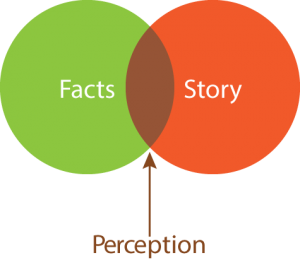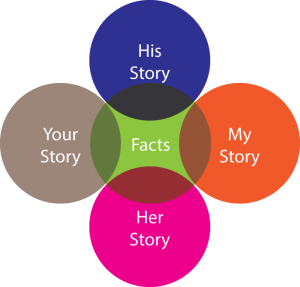Perception is reality. More specifically, YOUR perception is YOUR reality.
Understanding this is critical to how you view circumstances and your life in general. We do not interact directly with reality. We filter everything through our senses. We take the empirical evidence we see, hear, taste, smell and feel; then extract meaning from it. We determine that meaning based on our understanding of how the world works. This means our reality is largely created by combining what we sense with what we already understand. So, we take a limited sample of facts, blend it with our narrow story to create our perception of reality.  This individualized recipe for reality explains why we have so many conflicting opinions. Conservative vs. liberal, Apple vs. Android, Yankees vs. Red Sox. If you listen to the arguments without having a bias yourself, the opposing viewpoints can sound convincing. At the same time, they present alternative realities that seem to be unable to coexist. When we recognize our perception of reality is based on the intersection of facts we know and the story we tell, we better understand how different people can have world views that are polar opposites.
This individualized recipe for reality explains why we have so many conflicting opinions. Conservative vs. liberal, Apple vs. Android, Yankees vs. Red Sox. If you listen to the arguments without having a bias yourself, the opposing viewpoints can sound convincing. At the same time, they present alternative realities that seem to be unable to coexist. When we recognize our perception of reality is based on the intersection of facts we know and the story we tell, we better understand how different people can have world views that are polar opposites.
 So, the story you tell yourself has incredible power over your reality. You may be cast in your story as the victorious hero, the underdog against huge odds, the lovable fool, the helpful sidekick, an unlucky loser who can’t get a break, or even the villain. This story colors reality differently and affects how you see the world around you. By controlling the story you tell yourself, you gain power to influence the reality you experience.
So, the story you tell yourself has incredible power over your reality. You may be cast in your story as the victorious hero, the underdog against huge odds, the lovable fool, the helpful sidekick, an unlucky loser who can’t get a break, or even the villain. This story colors reality differently and affects how you see the world around you. By controlling the story you tell yourself, you gain power to influence the reality you experience.
We are pattern recognition “machines.”
No one has all the facts. We build the puzzle of reality with a small fraction of the actual puzzle pieces. The rest of the picture we fill in using the incredible human capacity for pattern recognition. For example – when you visit a hotel, you may find the toilet tissue has been folded. With just that bit of information, you fill in the gaps and create a story telling you the maid has been in the hotel room and has cleaned it since the last guest’s stay.
Al Seckel’s Ted talk shows how this pattern recognition skill can lead to misinterpretations. If we can be so wrong about small things like a pattern in a vase or the size and shape of a table, then we could conceivably be wrong about significant things as well.

The two children figures above are the same size.
Our perception of our lives could be misinterpreted just as easily. You may mistakenly think the world is out to get you when it would be much more helpful to believe others are cheering for your success. You may believe everything will fall apart if you’re not in control, but delegating to others would help you be more effective. Maybe you think pacifying someone who disagrees with you is your best option, but you would do better to stick to your guns even if it rocks the boat.
“You are the storyteller of your own life, and you can create your own legend or not.”
—Isabel Allende“Carpenters bend wood; fletchers bend arrows; wise men fashion themselves.”
—Buddha“Make your life itself a creative work of art.”
—Mike Ray, The Highest GoalThe above quotes are from Tom Peter’s ebook, Radical Personal Development.
So, what do you do now?
- Get other perspectives.
Find trusted advisors in your life you can use as sounding boards. These should not be people who completely agree with your worldview. Be willing to hear and consider opinions that may be in complete opposition to your own. Look for solutions created in unrelated industries or markets. You may find innovative solutions that have been applied in other areas will help you with your application. By getting other perspectives, you can obtain a 3-dimensional view of reality instead of your 2-dimensional perception. - Step back.
Take time to get some space from the work at hand. Spend some moments meditating and/or praying about your perception of things. Take a walk or visit an art gallery. Do something that engages your body, but leaves your mind idle. Your subconscious may tap into answers hidden in the corner of your mind. Open yourself up to alternate possibilities and see if you receive any new insight. - Craft the story you want your life to tell.
Are you happy with the story your telling? If not, what do you want your story to be? Wrestle with this question and build an epic story worthy of your life’s work… because that’s exactly what it is. Your life’s work. In the end, if your story were a movie, you shouldn’t be left wanting a refund on your ticket.
By considering your perspective and adjusting your story, you may find that you have more power over reality than you realized. You can’t change facts so that you’re 5 inches taller or so your distant and rich uncle leaves you a million dollars tomorrow. But you can see yourself in a new way and realize that opportunities exist in every moment. At least, that’s the story I’m telling myself right now.
